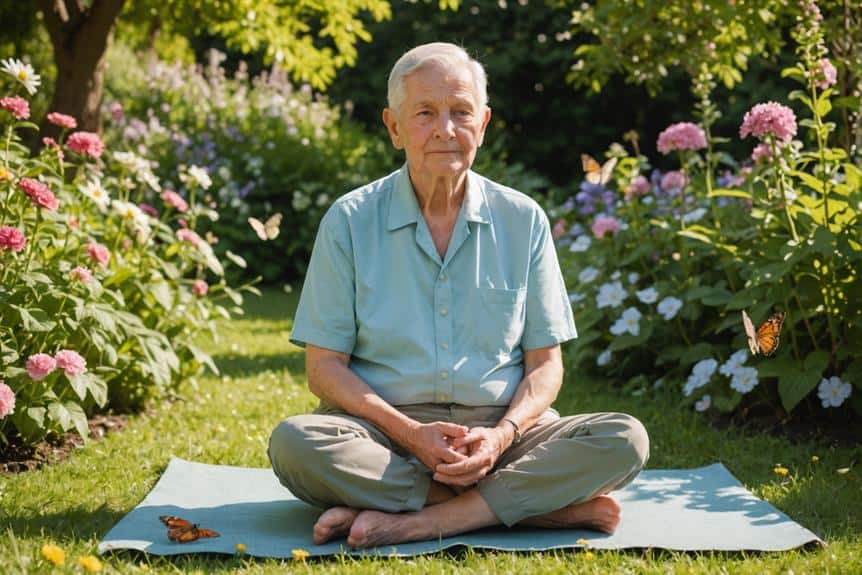Mindfulness and meditation provide elderly individuals with significant benefits for both mental and physical health. These practices help reduce stress, anxiety, and depression symptoms, enhancing emotional resilience and improving quality of life. Physically, mindfulness can boost your immune system, lower blood pressure, and improve sleep quality, leading to increased energy. Additionally, regular meditation sharpens cognitive function, helping maintain memory and focus. Engaging in community mindfulness programs fosters social connections, offers emotional support, and encourages consistency in practice. By exploring these practices, you can access a wealth of benefits that enhance your well-being and liveliness in later years.
Overview of Mindfulness and Meditation
Meditation, on the other hand, involves focused practice aimed at achieving deep relaxation. You might explore various meditation techniques, such as guided imagery or mantra repetition, to cultivate a peaceful mental state. These methods not only help you relax but also enable you to connect with yourself on a deeper level.
The growing interest in these practices among seniors is evident. Studies show that the prevalence of adult meditation practices has tripled in recent years, rising from 4.1% to 14.2%. This increase highlights the recognition of how mindfulness and meditation can positively impact your life.
Both mindfulness and meditation have shown significant benefits, including reducing stress, anxiety, and even symptoms of depression. As you incorporate these techniques into your daily routine, you may also notice improvements in physical health, such as lower blood pressure and better sleep quality. By embracing mindful practices and meditation techniques, you can enhance not just your mental health but your overall quality of life as well.
Mental Health Benefits for Seniors
Here are some specific mental health benefits you might experience:
- Stress Reduction: Mindfulness training can help you manage stress related to life changes, making it easier to adapt to alterations. This aligns with the principles of empowerment in social care, which emphasize enhancing self-determination and life management capacity.
- Emotional Resilience: By enhancing your emotional regulation, mindfulness helps you bounce back from difficult situations more easily.
- Anxiety Management: Meditation greatly lowers anxiety levels, providing a valuable tool for dealing with anxiety disorders.
Engaging in these practices can alleviate symptoms of both depression and anxiety, contributing to a better quality of life. Studies reveal that mindfulness techniques not only offer immediate relief but also lead to long-term mental health benefits, like improved cognitive function and increased emotional resilience.
Physical Health Advantages
Furthermore, meditation enhances your immune system, which is vital for older adults. A strong immune system leads to better health outcomes, allowing you to enjoy life without frequent illnesses. If you struggle with chronic pain, mindfulness meditation can also be a game changer. It's been shown to reduce both chronic pain and inflammation, providing relief from the discomfort that can often accompany aging.
Another advantage of meditation is its ability to improve sleep quality. As you age, stress and anxiety can disrupt your sleep patterns, but mindfulness techniques can help address these issues. Better sleep means you wake up feeling refreshed and ready to tackle the day ahead.
Enhancing Cognitive Function
Here are some key benefits of mindfulness meditation for enhancing cognitive function:
- Increased gray matter in the hippocampus: This brain area is essential for memory and learning, and boosting its health can slow cognitive decline.
- Enhanced attention strength: Regular practice helps improve your focus and endurance, allowing you to perform daily tasks more efficiently.
- Better emotional regulation: Mindfulness can foster resilience, helping you cope with the challenges of aging.
Community Support and Engagement
Participating in community-based mindfulness programs has shown numerous psychological benefits, including reduced stress and increased emotional resilience. When you practice mindfulness in a group setting, you're more likely to stay motivated and accountable. This social support from peers can make a huge difference, helping you establish and maintain a steady practice.
Here's a quick overview of the benefits of community engagement in mindfulness:
| Benefits | Description |
|---|---|
| Social Connections | Builds friendships, reducing feelings of loneliness. |
| Group Activities | Encourages regular practice and commitment. |
| Emotional Support | Provides a safe space for sharing experiences. |
| Improved Mental Health | Linked to reduced stress and enhanced resilience. |
| Shared Motivation | Helps maintain accountability in practice. |





